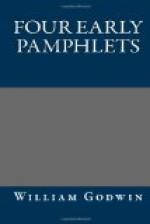Stiff in opinions, always in the wrong,
Was every thing by starts, and nothing
long,
But, in the course of one revolving moon,
Was chymist, fiddler, statesman, and buffoon.
My lord, I do not flatter you so far as to suppose that your abilities are as great, or that you will ever make so distinguished a figure as either of these noblemen. But I would have you imitate them in your humbler circle, and venture greatly, though the honour you should derive from it, should be only, that you greatly fell. Accept therefore, my lord, of one of the principal responsible offices without thought and without hesitation. Through terror or manly spirit, or whatever you choose to call it, resign again the next day. As soon as you have done this, make interest for another place, and if you can obtain it, throw it up as soon again. This, my lord, is not, as an ignorant and coxcomical writer has represented it, “the vibration of a pendulum,” but a conduct, wise, manly, judicious, and heroic. Who does not know, that the twinkling stars are of a more excellent nature, than those which shine upon us with unremitted lustre? Who does not know that the comet, which appears for a short time, and vanishes again for revolving years, is more gazed upon than either? But I am afraid the comet is too sublime an idea for your lordship’s comprehension. I would therefore recommend to you, to make the cracker the model of your conduct. You should snap and bounce at regular intervals; at one moment you should seem a blazing star, and the next be lost in trackless darkness.
My lord, there is nothing, which at all times I have taken more pains to subdue, than that overweening pride, and immeasurable conceit, which are the principal features of your lordship’s character. Nature, indeed, has furnished you with one corrective to them, or they must infallibly have damned you. It is timidity. Other people may laugh at this quality. For my part I esteem it worthy the loudest praise and most assiduous cultivation. When the balance hangs in doubt between the adventurousness of vanity and the frigidity of fear, ever incline to the latter side. I had rather your lordship should be a coward, than a coxcomb. If however you could attain to that reasonable and chastised opinion of yourself, which should steer a proper mean between these extremes, should make you feel your strength, when menaced by the most terrible adversaries, and your weakness, when soothed by the most fawning parasites, this, my lord, would be the highest perfection to which you could possibly attain. I will therefore close my epistle with the discussion of a case, which your lordship may think parallel to the species of behaviour I have recommended to your cultivation. I mean that of the celebrated and incomparable earl Granville, in the year 1746. I will show you what this nobleman did, and in how many particulars you must for ever hope in vain to resemble him.




